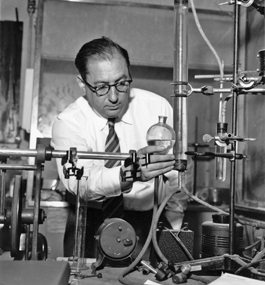Saul G. Cohen: An Appreciation
Professor Irv Epstein pens a tribute to the first chair of Brandeis’ School of Science, who died on April 24 at age 93

by Irv Epstein
"When I first visited Brandeis University in 1950, to consider joining it, I knew little more about it than that it had opened two years before to a small freshman class as a Jewish-sponsored university, with no restrictions on students, faculty and administration as to religion, race and gender.”
So opens the longest chapter, titled “At Brandeis,” of the recently published memoirs of Professor Saul G. Cohen, who died April 24, 2010, at age 93.
By the time I met Saul in 1966, at a graduation party for my friend and Harvard classmate Jonathan Cohen, Saul’s son, Saul had already served as Brandeis’ first chair of the School of Science, first dean of faculty, and first University Professor. He had played a key role in transforming a tiny college with uncertain prospects into a thriving research university.
Saul’s path to Brandeis, via Dorchester, Boston Latin School and Harvard, was not an easy one. Despite a stellar record at Harvard from his undergraduate years through his postdoctoral studies, the era’s pervasive discrimination against Jews in academia left him unable to find a faculty position. Instead, he joined the Polaroid Corporation in 1945, making critical contributions to the development of instant photography and establishing a relationship with the company’s legendary founder, Edwin Land, that lasted for another 30 years.
In 1950, Saul left Polaroid to join the faculty of Brandeis. In addition to taking on numerous administrative leadership roles, he worked with pre- and postdoctoral students to publish more than 100 articles and reviews on topics like photochemistry, reaction mechanisms and free radicals.
Saul was completing his last of several terms as department chair when I became a member of the Brandeis faculty in 1971, but he continued to provide valued leadership for the department and sage advice to me and many others in the university for years to come. I remember his wise aphorisms, for example, about the danger of confusing autobiography with philosophy; he believed one needed to look beyond one’s own experiences. Another of Saul’s adages, born out of his youth in the Great Depression, stressed the importance of “never breaking a man’s rice bowl.”
He pointed out to me that if I was having difficulty understanding a scientific paper, the deficiency was at least as likely to lie with the author’s logic or presentation as with my ability to comprehend the argument. He was equally generous in sharing his supportive wisdom with his undergraduate, graduate and postdoctoral students. Saul maintained his world-class research program in organic photochemistry and enzyme mechanisms until he was nearly 80, collaborating in later years with son Jonathan, who had become a professor of neurobiology at Harvard Medical School.
Saul received many honors over the course of his career; perhaps the ones he treasured most were an honorary degree from Brandeis and election to Harvard’s board of overseers. He lived a rich life, and was stunningly successful in science, technology, academia and family matters. His family, which includes two children, two stepchildren, nine grandchildren and his wife, Anneliese, has established the Saul G. Cohen Memorial Endowment Fund at Brandeis to support an annual lecture in his memory. For more information, contact Raquel Rosenblatt at rosenbla@brandeis.edu.
Irv Epstein is the Henry F. Fischbach
Professor of Chemistry.
